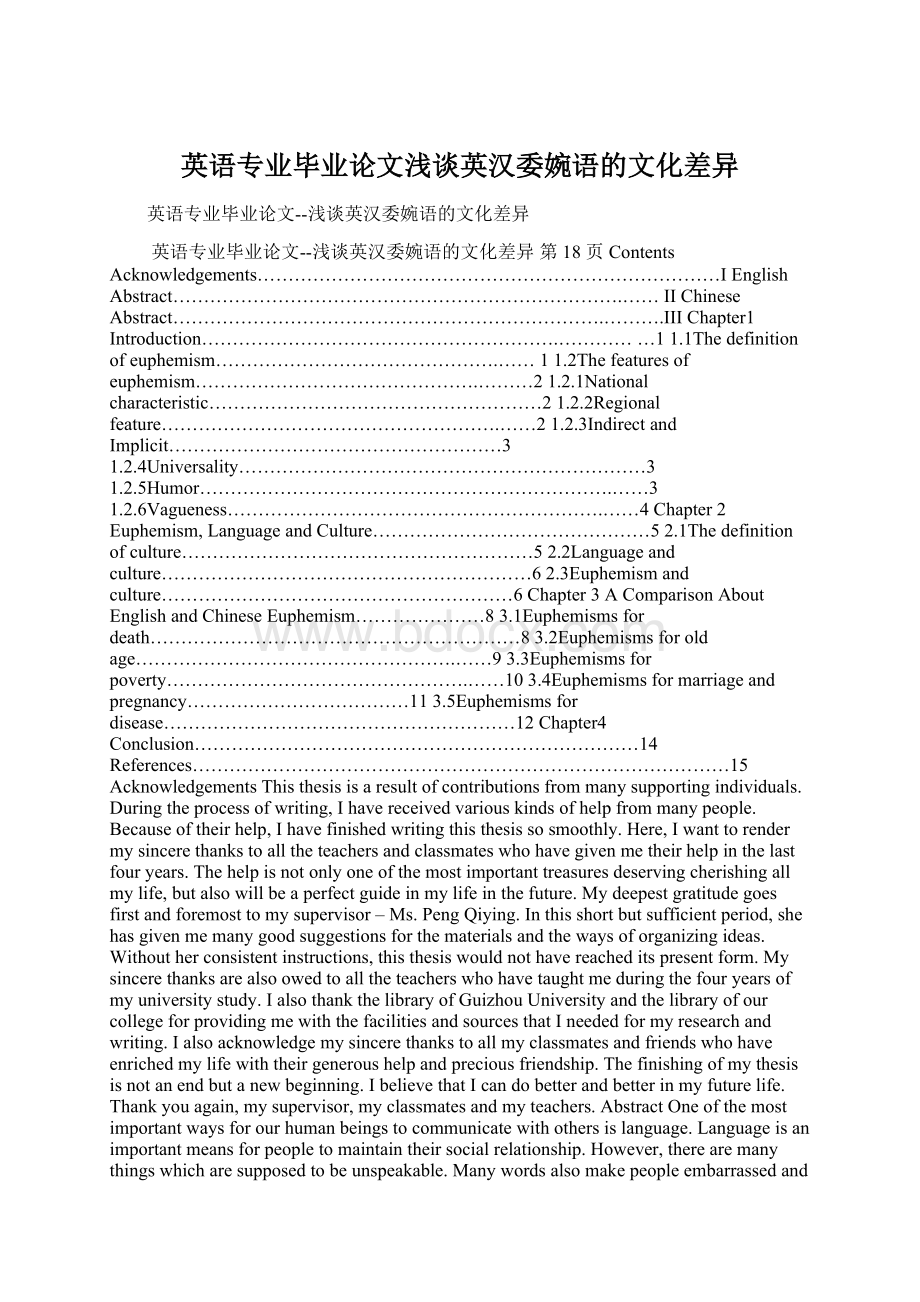英语专业毕业论文浅谈英汉委婉语的文化差异.docx
《英语专业毕业论文浅谈英汉委婉语的文化差异.docx》由会员分享,可在线阅读,更多相关《英语专业毕业论文浅谈英汉委婉语的文化差异.docx(5页珍藏版)》请在冰豆网上搜索。

英语专业毕业论文浅谈英汉委婉语的文化差异
英语专业毕业论文--浅谈英汉委婉语的文化差异
英语专业毕业论文--浅谈英汉委婉语的文化差异第18页ContentsAcknowledgements…………………………………………………………………IEnglishAbstract……………………………………………………………….……IIChineseAbstract…………………………………………………………….……….IIIChapter1Introduction………………………………………………….……………11.1Thedefinitionofeuphemism……………………………………….……11.2Thefeaturesofeuphemism……………………………………….………21.2.1Nationalcharacteristic………………………………………………21.2.2Regionalfeature……………………………………………….……21.2.3IndirectandImplicit………………………………………………31.2.4Universality…………………………………………………………31.2.5Humor………………………………………………………….……31.2.6Vagueness…………………………………………………….……4Chapter2Euphemism,LanguageandCulture………………………………………52.1Thedefinitionofculture…………………………………………………52.2Languageandculture……………………………………………………62.3Euphemismandculture…………………………………………………6Chapter3AComparisonAboutEnglishandChineseEuphemism…………………83.1Euphemismsfordeath……………………………………………………83.2Euphemismsforoldage…………………………………………….……93.3Euphemismsforpoverty………………………………………….……103.4Euphemismsformarriageandpregnancy………………………………113.5Euphemismsfordisease…………………………………………………12Chapter4Conclusion………………………………………………………………14References……………………………………………………………………………15AcknowledgementsThisthesisisaresultofcontributionsfrommanysupportingindividuals.Duringtheprocessofwriting,Ihavereceivedvariouskindsofhelpfrommanypeople.Becauseoftheirhelp,Ihavefinishedwritingthisthesissosmoothly.Here,Iwanttorendermysincerethankstoalltheteachersandclassmateswhohavegivenmetheirhelpinthelastfouryears.Thehelpisnotonlyoneofthemostimportanttreasuresdeservingcherishingallmylife,butalsowillbeaperfectguideinmylifeinthefuture.Mydeepestgratitudegoesfirstandforemosttomysupervisor–Ms.PengQiying.Inthisshortbutsufficientperiod,shehasgivenmemanygoodsuggestionsforthematerialsandthewaysoforganizingideas.Withoutherconsistentinstructions,thisthesiswouldnothavereacheditspresentform.Mysincerethanksarealsoowedtoalltheteacherswhohavetaughtmeduringthefouryearsofmyuniversitystudy.IalsothankthelibraryofGuizhouUniversityandthelibraryofourcollegeforprovidingmewiththefacilitiesandsourcesthatIneededformyresearchandwriting.Ialsoacknowledgemysincerethankstoallmyclassmatesandfriendswhohaveenrichedmylifewiththeirgeneroushelpandpreciousfriendship.Thefinishingofmythesisisnotanendbutanewbeginning.IbelievethatIcandobetterandbetterinmyfuturelife.Thankyouagain,mysupervisor,myclassmatesandmyteachers.AbstractOneofthemostimportantwaysforourhumanbeingstocommunicatewithothersislanguage.Languageisanimportantmeansforpeopletomaintaintheirsocialrelationship.However,therearemanythingswhicharesupposedtobeunspeakable.Manywordsalsomakepeopleembarrassedandunhappy.So,inordertoavoidtheoffensivenessandmisunderstandings,peopleusuallyusetheindirectorpleasantexpressionstoreplacewiththoseunpleasantandrudewordsincommunication.Wecallthateuphemism.Euphemismplaysanimportantroleinpeople’ssocialcommunicationandexistsinalmosteverycultureandsociety.Inordertohelpthelanguagelearnertounderstandeuphemismbetter,thisthesismainlyexplorestheculturaldifferencesbetweenEnglishandChineseeuphemisms.Inchapterone,theauthorintroducesthedefinitionandfeaturesofeuphemism.Inchaptertwo,theauthorintroducestherelationshipbetweeneuphemism,languageandculture.ChapterthreeismainlyacontrastivestudyofEnglishandChineseeuphemismfromtheseaspects:
euphemismsofdeath,poverty,marriage,pregnancyanddisease.Thentheauthorbringstotheconclusionthatifthelanguagelearnerswanttolearnaforeignlanguagewell,itisbetterthathehasagoodknowledgeofitsculture.KeyWords:
euphemism,definition,feature,culture,difference摘要语言是人与人交流的最重要的方法,也是保持社会关系的重要方法。
然而又很多东西是不能直接说的,有很多词语会让人尴尬和不愉快。
因此,为了避免冒犯以及误会,人们在交流的时候通常用一些间接的以及令人愉快的表达来代替那些令人不高兴的粗鲁的词语。
那些词语就叫做委婉语。
委婉语在人们的日常交流中扮演着重要的角色。
委婉语是为了避免禁忌语,且存在于各种文化和社会中。
为了帮助语言学习者更好的了解和掌握委婉语,这篇论文主要讨论了英语委婉语和中国委婉语在文化上的不同。
在第一章,作者介绍了委婉语的定义和特点。
在第二章,作者介绍了委婉语,语言以及文化三者的关系。
第三章主要是对比有关死亡,贫困,婚姻,怀孕和疾病方面的中英委婉语。
由此得出结论,如果想要学好一门语言,就有必要了解这门语言的文化。
关键词:
委婉语;定义;特点;文化;差别Chapter1Introduction1.1ThedefinitionofEuphemismVerbalcommunicationisoneofthemostimportantmethodspeopleapplytomaintainthesocialrelationship.Inordertoavoidtheoffensivenessincommunication,peopleusuallyusesomepoliteorpleasantwordstoreplacetherudeorembarrassingones.Therefore,euphemismemerges.Euphemismisacommonlinguisticphenomenoninallcultures,ittakesanveryimportantroleinpeople’sdailycommunication.EuphemismisoriginatedfromtheGreek.Itsprefix“eu”meansgood,pleasant,anditsroot“pheme”meansspeech.Thus,euphemismliterallymeans“tospeakwithgoodwordsorinapleasantmanner”(NeamanandSilver,1990:
32).AccordingtoAllanandBurridge(1991:
11),thedefinitionofeuphemismis:
Aeuphemismisusedasanalternativetoadispreferredexpression,inordertoavoidpossiblelossofface:
eitherone’sownfaceorthroughgoingoffense,thatoftheaudience,orofsomethirdparty.Manypeoplehavedefinedeuphemism.Therearesomedefinitionsofeuphemismbelow:
(1)mildorvagueexpressionsubstitutedforaharsherormoredirectone.(PocketOxfordEnglish-ChineseDictionary,OxfordUniversityPress,1996)
(2)thesubstitutionofamild,indirect,orvagueexpressionforonethoughttobeoffensive,harshorblunt.(Webster’sDictionaryofAmericanEnglish,RandomHouse,Inc.1997)(3)(anexampleof)theuseofamorepleasant,lessdirectnameforsomethingthoughttobeunpleasant.(LongmanEnglish-ChineseDictionaryofContempo-raryEnglish,LongmanGroupUKLimited,1988)(4)Aeuphemismisapolite,pleasant,orneutralwordorexpressionthatisusedtorefertosomethingwhichpeoplemayfindupsettingorembarrassingtotalkabout,forexample,sex,thehumanbodyordeath.(CollinsCobuildEnglishDictionary,SFLEP,2000)(5)Rhetoricaltrope:
apleasantreplacementforanobjectionablewordthathaspejorativeconnotations.(RoutledgeDictionaryofLanguageandLinguistics,FLERP,2000)InChina,ChenWangdao(1997)definedeuphemismasafigureofspeechinwhichroundaboutandimplicitwordsandexpressionsareusedtosubstitutedirectexpressionstohintthemeaning.“Weiwan(委婉)”isafigureofspeechinChinese.Itisalsocalled“wanqu(婉曲)”or“wanzhuan(婉转)”.AnotherfigureofspeechinChineseiscalled“bihui(避讳)”or“huishi(讳饰)”.Thecombinationofthefigureofspeech“weiwan(委婉)”andthefigureofspeech“bihui(避讳)”inChineseisequivalenttothefigureofspeech“euphemism”inEnglish(LiGuonan,2001:
190).1.2ThefeaturesofEuphemism1.2.1NationalcharacteristicEuphemismisacommonlanguagephenomenonintheworldculture.However,differentcountriesanddifferentnationsindifferentsurroundingsandsocialenvironmenthavedifferentproductionandlivingmanners,andtheirculturedepositionsarealsodifferent.Soeuphemismindifferentlanguagehassomedifferenceseither.Thedifferencesaretherepresentationofthenationalcharacteristic.Thereisatypicalexampleabouttheword“poor”,itdescribedanyoungwomanwholivedwithhardcondition.Theparagraphusesseveraleuphemismsofpoor:
“IusedtothinkIwaspoor.ThentheytoldmeIwasnotpoor,Iwasneedy.Thentheysaiditwasself-defeatingtothinkofmyselfasneedy,thatIwasculturallydeprived.Thentheytoldmedeprivedwasabadimage,thatIwasunderprivileged.Thentheytoldmethatunderprivilegedwasoverused,thatIwasdisadvantaged.IstilldonothaveadimebutIhaveagreatvocabulary!
”Needy(lackofcommodity),culturallydeprived(losetheopportunityofeducation),underprivileged(havinglessmoneyandfeweropportunitiesthanmostpeopleinsociety),disadvantaged(humble).Thosefourwordsaretheeuphemismsfor“poor”whichthegovernmentusedtocheatthepublic.1.2.2RegionalfeatureDifferentregionshavedifferentcustoms,sodothelanguage.Forinstance,breadisakindofdailyfoodinBritish,andthephrase“takebreadoutofsomeone’smouth”meanstogooffwithsomeone’sjob.Andthereisanotherexample.AnAustralianwomanmarriedtoanAmericanman.TheyspenttheirhoneymooninAmerica.Andoneday,thecoupleintendedtogotoapartytogether.Butthebridegroomcouldnotfindasuitablefulldress.Thebridetookoutabirthdaysuitthatshegavehimasapresentafewdaysagoandsaid:
“Whynotwearyourbirthdaysuit?
”However,thewholefamilywereallastonishedbecauseinAmericanEnglish,“inone’sbirthdaysuit”istheeuphemisticexpressionof“naked”.Sothisembarrassingsituationwasresultedfromtheregionaldifferencesineuphemism.1.2.3IndirectandimplicitThemostimportantfeatureofeuphemismisindirectandimplicit.Thepurposeofeuphemismistousesomeindirectexpressionstoavoidsomethingthatmakespeopleunhappy.Andthisistheindirectcharacter.Euphemismalwaysgivespeoplehintsinaroundaboutway.Wecaninferthedeepermeaningandintentionfromtheconversation.Forexample:
--“Don’tyouthinkmycookingiswonderful?
”Thegirlasked.--“Areyoufishingforcompliments.”Herboyfriendresponded.Intheconversationabove,theboyfriendnotonlyansweredthegirlimplicitly,anddidnotembarrasshisgirlfriend.Similarly,whensomeoneisill,wealwayssayheisundertheweather.Ifsomeoneismad,wesayheissoftinmind.1.2.4UniversalityUniversalityissomethingthatiswell-knownandacceptedbyallofthehumanbeings.Euphemismalmostexistsineverylanguageandculture.Andeachlanguagehasitsownta